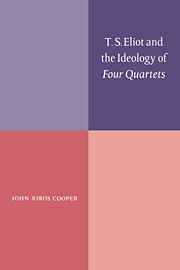Book contents
- Frontmatter
- Contents
- Acknowledgements
- List of abbreviations
- 1 Ash-Wednesday and the transition to the late candour
- 2 Provisional delusions: crisis among the mandarins
- 3 The society of the mandarin verse play
- 4 Representing Four Quartets: the canonizers at work
- 5 Four Quartets: the poem proper
- 6 White mythology: the comedy of manners in Natopolis
- Notes
- Works cited
- Index
5 - Four Quartets: the poem proper
Published online by Cambridge University Press: 07 October 2011
- Frontmatter
- Contents
- Acknowledgements
- List of abbreviations
- 1 Ash-Wednesday and the transition to the late candour
- 2 Provisional delusions: crisis among the mandarins
- 3 The society of the mandarin verse play
- 4 Representing Four Quartets: the canonizers at work
- 5 Four Quartets: the poem proper
- 6 White mythology: the comedy of manners in Natopolis
- Notes
- Works cited
- Index
Summary
In some emergency we may have to pretend that we are not frightened, in order to prevent a panic.
T. S. Eliot, A Sermon Preached in Magdalene College, Cambridge, 1948.BURNT CHILDREN
The ‘interpretation’ I would like to offer of Four Quartets positions the text as a social and political document in the historical context of its reception. I want to recover, as far as it is possible, those meanings the artefact carried over to its mandarin readers in the midst of the crisis of Europe at the end of the war. The first stage in delineating the poem's ‘meaning’ in this way has been the subject matter of the previous chapter. The critical repositioning of the poem as an autonomous aesthetic artefact and as pure subjectivity permitted those readers, weighed down by the dangers, pressures, and devastations of total war and its aftermath, to satisfy metaphysical hungers that Adorno, referring to an earlier crisis, called ‘the ontological need’ (Negative Dialectics 61) in modernity, and, from that, to make out a saving renunciatory detachment. In one sense the poem acknowledged the belated arrival, twenty-five years later, of all of Europe to the intellectual and moral ruin of Germany and Central Europe in 1918. The spiritual chaos of that earlier crisis of defeat gave to Martin Heidegger's Being and Time its particular point and savour in the 1920s. Heidegger's book defined its own task as the relentless and unsentimental unveiling of ‘the ontological’ that had become thoroughly obscured by philosophical traditions obsessed with the ontic. It was a cry of faith in a new ‘depth’ ontology, that was intensely poetic, self-assertively unblinkered, ironic, but, above all, consolatory.
- Type
- Chapter
- Information
- T. S. Eliot and the Ideology of Four Quartets , pp. 122 - 181Publisher: Cambridge University PressPrint publication year: 1995



